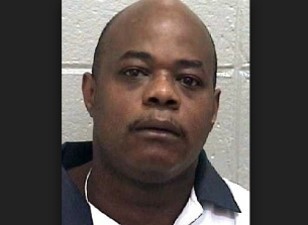JACKSON, Ga. (AP) A man convicted of killing a sheriff's deputy moments after robbing a convenience store in central Georgia was executed Tuesday. <br />
<br />
Robert Wayne Holsey, 49, was declared dead at 10:51 p.m. at the state prison in Jackson, authorities said. <br />
<br />
Holsey was sentenced to die for the Dec. 17, 1995, killing of Baldwin County sheriff's deputy Will Robinson. A jury convicted Holsey in February 1997. <br />
<br />
Holsey robbed a convenience store in the town of Milledgeville early on Dec. 17, and the store clerk immediately called police, describing the suspect and his car, prosecutors said. <br />
<br />
According to court documents, Robinson stopped a car at a nearby hotel minutes later and radioed in the license plate number. As Robinson approached the vehicle, Holsey fired at him, prosecutors said. The deputy suffered a fatal head wound. <br />
<br />
Holsey fled but was arrested a short time later at his sister's house. <br />
<br />
Holsey's lawyers filed a number of last-minute appeals to stop the execution but they were all rejected. Holsey was executed nearly an hour after the U.S. Supreme Court rejected a request for a stay. <br />
<br />
Moments before he was put to death, Holsey addressed the victim's father. <br />
<br />
``Mr. Robinson, I'm sorry for taking your son's life that night,'' he said. ``He didn't deserve to die like that.'' <br />
<br />
Holsey added, ``I hope you can find it in your heart to forgive me and my family.'' <br />
<br />
He seemed to be addressing three men in the front row who sat with their arms around each other's shoulders. The front row is reserved for state witnesses and family members of the victim, but prison officials could not immediately say whether the men were relatives. <br />
<br />
He also seemed to be addressing a woman in the second row when he said ``Take care of mama.'' Relatives of the condemned inmate are allowed to sit in that row. <br />
<br />
The warden left the death chamber at 10:34. Then, for about a minute, Holsey appeared to be mouthing a message to the woman in the second row. Records from past executions show the lethal drug generally begins flowing within a minute or two of the warden's departure. <br />
<br />
Robinson's family released a statement earlier Tuesday thanking the people who have supported them over the years. <br />
<br />
``William was a leader and true hero, evidenced by the years of outpouring of support to our family by all who loved and respected him,'' the statement said. ``As Georgia's justice system and the federal courts have played, replayed, visited and revisited the evidence ... through its due process these nineteen years, we simply have hoped for the judicial process to unfold and to reach a final conclusion.'' <br />
<br />
Also earlier Tuesday, Holsey received visits in prison from relatives, friends, three clergy members and a lawyer. <br />
<br />
Holsey's lawyers had argued in a clemency petition that their client should be spared lethal injection because his 1997 trial was mishandled by an alcoholic lawyer who was distracted by his own problems. The trial lawyer died in 2011. <br />
<br />
The original lawyer told the court that intellectual disability would not be a factor in the case, despite records showing Holsey was intellectually disabled, Holsey's lawyers argued. And the jury also didn't hear details about Holsey's childhood, which was characterized by horrifying abuse at the hands of his mother, according to the petition. <br />
<br />
In their efforts to halt the execution, Holsey's lawyers argued that he was intellectually disabled. The U.S. Supreme Court in 2002 barred execution of the intellectually disabled, but left the states to determine who is intellectually disabled. <br />
<br />
Georgia requires death-row inmates to prove intellectual disability beyond a reasonable doubt in order to be spared execution on those grounds. Courts have consistently upheld Georgia's toughest-in-the-nation standard of proof on this issue. <br />
<br />
But the U.S. Supreme Court in May knocked down a Florida law that said any inmate who tests above 70 on an IQ test is not intellectually disabled and may be executed. The opinion said IQ tests have a margin of error and inmates whose scores fall within the margin must be allowed to present other evidence of intellectual disability. <br />
<br />
The state of Georgia argued in court filings that Holsey is not intellectually disabled. An expert found that Holsey had a learning disability but was not disabled, and his siblings relied on him as a leader, the state's lawyers argued. <br />
<br />
The state also disputed the idea that Holsey's trial lawyer was ineffective, saying the prosecutor in the case and the judge both testified that the original lawyer performed very well. <br />
<br />
The state also argued that the U.S. Supreme Court's May ruling was tailored specifically to Florida and does not apply to Georgia's law.

Robert Wayne Holsey
http://accesswdun.com/article/2014/12/282786
© Copyright 2015 AccessNorthGa.com
All rights reserved. This material may not be published, broadcast, rewritten, or redistributed without permission.

